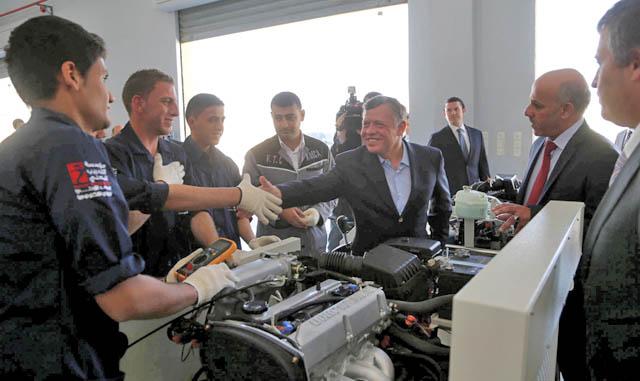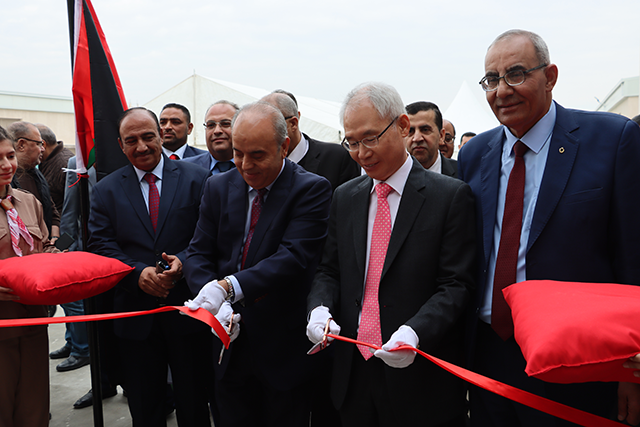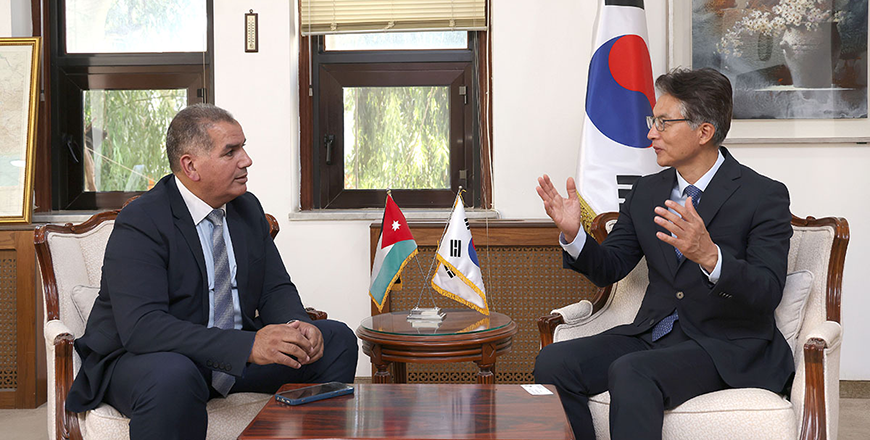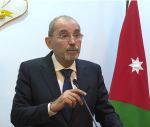You are here
King urges government to create more jobs for youth
Apr 30,2014 - Last updated at Apr 30,2014

AMMAN — His Majesty King Abdullah on Wednesday congratulated Jordanian workers on the occasion of Labour Day, during a visit to the Jordan-Korea Technology Institute in the Hashemiyeh area in Zarqa Governorate, some 22km east of Amman.
He also met workers and trainees at the institute, holding a dinner in their honour.
Earlier in the day, His Majesty posted tweets expressing his pride in Jordanian workers and their efforts in building the country.
His Majesty tweeted: “Proud of Jordanians who roll up their sleeves & work hard to build our country, #Jordan’s strength lies in its people, Happy Labour Day #ABH.”
The King also said on Twitter: “Our youth and workers always deserve the best, & the gov’t must build on its recent efforts to provide them with more job opportunities #ABH.”
During the ceremony, Labour Minister Nidal Katamine said he considered this day as one that honours the work and achievement of all workers, regardless of their locations.
Katamine said that His Majesty’s unlimited support for workers in all fields is their main motivation, praising the ongoing Royal directives to secure job opportunities that ensure Jordanians a decent living.
He said that the National Strategy for Employment, which was a result of a Royal initiative in mid-2012, is aimed at dealing with employment issues and policies on a national scale.
The initiative included three main focal points.
The first was securing jobs for the unemployed and enhancing the balance between skills and growth in micro-, small- and medium-sized enterprises.
The second was increasing productivity; and the third was restructuring economic human capital. The initiative will be implemented through short-, medium- and long-term phases.
He added that the Labour Ministry seeks to achieve the strategy’s vision by improving the living standards of Jordanians through enhancing operations and increasing wages and productivity.
The minister noted that the national recruitment campaign was aimed at organising the labour market.
The programmes and projects implemented as part of the campaign have, since the beginning of 2013, seen jobs created for 30,157 people in the private sector, 14,700 job opportunities provided through self-financed projects and 1,404 people obtain training.
In line with the King’s directives to follow up on the status of employed people through the campaign, the ministry asked a specialised company to conduct an “objective” study, he said.
The results showed that the percentage of those who are still working is 64 per cent (20,000 workers out of 30,157), with the remaining 36 per cent quitting their jobs due to long working hours and low wages, the minister added.
His Majesty directed the government to study the reasons behind the youths’ decision to quit work, and to find ways to tackle these reasons through the development of training, rehabilitation and social security programmes for workers.
Katamine said that the ministry has worked on developing vocational employment and guidance programmes that cover all governorates.
The minister highlighted ongoing efforts to update relevant legislation, saying the envisioned versions of these laws and regulations “will guarantee increased economic participation, integration of women into the workforce, and will limit guest workers in targeted sectors by organising the status of these workers and offering them a grace period to rectify their status”.
He clarified that the figures for the unemployment rate at a national level vary between and within provinces, governorates, the countryside and villages.
This poses a challenge when it comes to the distribution of development gains, Katamine stated, pointing out that the most important solutions developed by the government to meet this challenge have been to direct investment towards outlying provinces and to distribute them within governorates.
As part of the quest to provide more job opportunities, especially for girls in remote areas, the official stressed that his ministry has continued to develop its nine offices around the Kingdom, which have managed to recruit 2,200 women. He also stated that there is work currently being done to expand existing branches which will lead to the employment of another 2,255 females in the coming six months.
He also said that the government has been able to reduce unemployment, with the figures of the first quarter reaching 11.8 per cent compared to the same period in 2013. This change follows a two-point decrease in the last quarter of 2013 in comparison to the same period in 2012, according to reports by the Department of Statistics.
After His Majesty was briefed on the National Strategy for Employment, he commended the government’s efforts in this area, and urged them to do more to help employ the youth of Jordan.
During his visit to the Jordan-Korea Technology Institute, he toured the sections of the facility and listened to trainees explaining the kind of education they receive there.
He was also briefed by officials on the importance of training offered by the institute, which utilises the latest hardware and advanced systems to develop the student’s practical, technical and creative skills, preparing them to effectively enter the labour force.
The institute, established in 2007 and functioning under the Vocational Training Corporation (VTC), offers training in seven specialities, including software technologies, automatic control, communications, medical devices, auto repair, air conditioning, welding and blacksmithing.
Graduates who have a Tawjihi (general secondary examination) earn a technical diploma in cooperation with the Balqa Applied University, while those who have not finished high school obtain certificates for the training courses they attend.
In remarks to the Jordan News Agency, Petra, VTC Director General Majed Habashneh said the King’s visit to the institute signals the importance he attaches to technical training and encourages more efforts to be made to prepare and recruit the local labour force.
He said the institute and other similar vocational training faculties have been established as part of a Royal vision, mostly after the King paid visits to advanced countries in this field and was acquainted with their experiences. The institute, for example, is the fruit of Jordan-Korea partnership, Habashneh said, announcing that a similar facility offering training in renewable energy will soon be inaugurated in Maan, and another in Salt, specialised in the pharmaceutical industry.
According to the director of the Jordan-Korea institute, Mahmoud Abu Zeit, 420 students have graduated from the centre, while 290 others are now receiving training, constituting 90 per cent of its capacity.
Car repair student Rabie Khamis told Petra that his training will pave the way for him to join the labour market “and prove highly proficient”.
Jordan’s labour movement started in Jordan relatively early, when the trade union was established in 1954.
The ceremony was attended by Royal Court Chief Fayez Tarawneh and King’s Office Director Imad Fakhoury and a host of senior officials.
Related Articles
AMMAN — South Korea is keen on boosting its development cooperation with Jordan and stands ready to explore further support to the Kingdom.&
AMMAN — The Jordan-Korea Industrial School in Zarqa (JOKINZ) was opened on Tuesday as part of a Korea International Cooperation Agency (KOIC
AMMAN — Korean Ambassador to Jordan Kim Pil-woo on Tuesday highlighted the Kingdom's status as Korea's oldest partner in the region since th


















